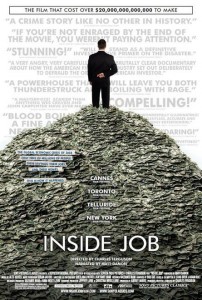
Charles Ferguson’s incensed documentary “Inside Job” examines the complex causes of America’s recent financial collapse.
About two months after Oliver Stone resurrected “Wall Street” for a timid fictionalization of America’s recent financial crisis, we now get a much more suitably enraged response: Charles Ferguson’s documentary “Inside Job.”
Ferguson’s last documentary, 2007’s “No End in Sight,” was an volatile indictment of President Bush’s handling of the Iraq War, so it’s clear now that he only gets in muckraking mode when our country really is in the midst of something truly catastrophic. “Inside Job,” narrated by a tactful Matt Damon, creates a thorough outline of that catastrophe, condensing decades worth of corporate intrigue into a brisk, accessible narrative.
The film is broken into five separate sections, beginning with the earliest warning signs that something could go deeply wrong, and finally looking ahead to how those deep wrongs could keep flourishing well into the future.
The crisis is traced back as far as the 1970s, when government deregulation gradually brought an end to the era of economic stability that America had enjoyed for decades. As the events gradually build to the 2008 crash, the film starts injecting its informative structure with pure indignation. We see how America’s largest investment banks started betting against their own loans, so that the everyman’s failure still reaped profits behind the scenes.
We get statistics, plenty and plenty of them — the most unnerving are probably the multi-million dollar bonuses that CEOs received right after their own investment banks declared bankruptcy.
There are interviews with financial experts who calmly recount how they predicted something terrible on the horizon, only to be ignored. Eliot Spitzer even talks of how his own attempts to bring justice down on the industry, and how the vices that were used to push him out of office can be found right on Wall Street, in much more shocking extremes.
“Inside Job” finds an underdog of reason in Spitzer, which ought to tell you a lot about what kind of corruption the film is dealing with.
Speaking of reason, it’s a hard thing to keep completely intact when overcome with emotion — especially anger — so it’s unfortunate that Ferguson’s methodology sometimes distracts from his higher purpose.
He stirs himself into an occasional contradiction, like how we’re expected to be angry over every bank that received a bailout, and also for each bank that didn’t get one.
Bigger problems arise in his interviews, and not just because he thinks it’s credible to have a therapist and an escort service manager simply say that “many” Wall Street executives hire prostitutes and use cocaine.
All of the truly guilty parties in the economic downfall — like former Chairman of the Federal Reserve Alan Greenspan and former Secretary of the Treasury Larry Summers — declined interviews, so Ferguson instead indicts Ivy League business professors who make fortunes consulting for crooked investment banks.
They’ve done some backward dealing, sure, but although Ferguson is great at pressing uncomfortable questions, he likes to throw his interviewer subjects off, show them stammering for a few seconds and then cut away. They do a good enough job making themselves look particularly bad with slimy defenses — why not let them keep at it?
He should have taken a hint from his funniest interview subject, an investment bank lobbyist who is so perfectly versed in long-winded, robotic non-answers that he’s a great symbol of corporate idiocy, without ever making one concrete statement.
Still, even when Ferguson doesn’t play fair, he’s dealing with people who did the same with more dire consequences, and the corporate horrors in “Inside Job” speak for themselves. As outraged as the entire film is, the worst horror is saved for the end — when Obama’s presidency is scrutinized. We relive his campaign promises to curb the crisis and change the practices that brought it on — only to learn that Obama ended up hiring many of the same people responsible for the recession, meaning we might be destined for another “status quo” presidency.
The issues presented throughout “Inside Job” are made out to be so enormous, secretive and institutional that the film must be kidding itself with its we-can-all-fight-this closing statement. Straightening out the country’s severe economic mess is going to be a very, very long bureaucratic process for the fancy suits in charge. The best chance the everyman has is to simply stay informed throughout the entire mess. “Inside Job” does what it can for the cause.
Grade: B
Silverstein is a member of the class of 2013.




